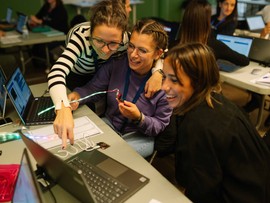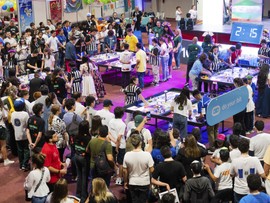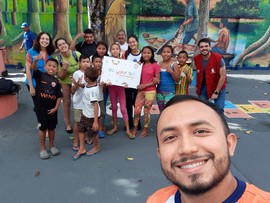Fondation CGénial – Yes We Code!
Preparing the next generation in France with a practical approach to digital sciences
What do a smart bin and a climbing stopwatch have in common? Both are super winners in Fondation CGénial’s amazing Yes We Code! programme!
If you struggle to sort your plastic from your cans, then the students at Saint-Exupéry college of the Orléans-Tours academy have you in mind. They used AI with their micro:bits to help sort recycling in a fantastic smart bin project.
Perhaps you’re inspired by the incredible efforts of the Olympic rock climbers? The students at Pierre Mendès France high school of the Amiens academy certainly were, as they created a fun climbing stopwatch project.
This year, 176 projects were submitted and 45% of participants were girls, with 20 other winners announced too, in the biggest Yes We Code! yet.
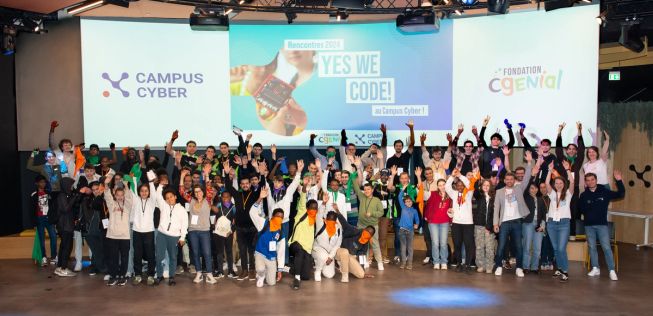
A practical approach to digital sciences
Since 2006, Fondation CGénial has been increasing interest in STEM among middle and high school students, in order to encourage them to pursue careers in these fields.
Following a 'learning by doing' approach, Fondation CGénial developed the Yes We Code! programme to support French teachers and students to develop coding skills, foster team spirit and creativity, and prepare young people for the jobs of tomorrow. More than 1,000 schools and 80,000 students participate in the Yes We Code! programme, which grows every year.
Each teacher engaged in the programme benefits from a digital learning kit containing micro:bits, sensors and accessories which their students can use to create digital projects. Throughout the school year, they take part in training and webinars organised in partnership with national education partners, and use resources provided by Fondation CGénial and their partners. The teachers support their students, who work on their projects independently during their classes (technology, mathematics, biology, physics, etc) or during science clubs.

The kit is a real creativity booster for students! The design of the micro:bit makes it easy to integrate it in our programs and to experiment new teaching techniques.

High-school Biology teacher
At the end of the year, students are invited to showcase their projects at an annual event and a national contest, bringing together students from all over the country to highlight the most creative and innovative projects. The submitted projects are diverse and are often related to societal or environmental issues: connected bike helmets to guarantee safety on the roads, alarm systems, connected hives to track bees, environmental robots which help sorting waste, colour detectors for the colour blinds, etc.
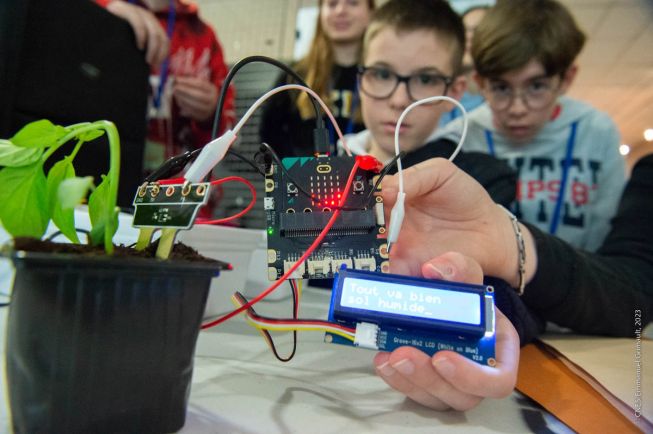
An impact on self-confidence and coding skills

I worked on a group project that allowed me to develop my creativity and gain a little more confidence in programming. It was captivating to observe how certain systems operate!

Middle-school student
Fondation CGénial contributes to making technology a more diverse and open ecosystem, where students feel confident about pursuing a digital career, regardless of their gender or social background.
Moreover, women are under-represented in the digital sector due to a lack of knowledge of the professions or because of gender stereotypes: only 30% of employees in the digital sector are women, all professions combined.
After a Yes We Code! workshop, an 18-year-old female student had a revelation about her self-censorship and realized that she actually liked coding, but didn’t have the courage to pursue it as a career because she wasn’t good in math.
The last social impact evaluation of the project reveals that:
- 61%of the students feel more confident in their coding skills after their participation in the program.
- 66%of the students believe that the program helped them develop their digital culture.
- 36%of the students feel at ease with using the micro:bit at the end of the year (versus 4% at the beginning of the year).
The program aims to develop technical skills, not only for students, but also for their teachers, in order to improve their teaching methods, and to enable them to motivate students:
- 94%of the teachers feel very confident with using the kit during classes.
- 97%of them believe it helped provide tangible examples to their classes.
- 98%felt that the program helped them to develop technical skills in their students.

It’s very promising and instructive for the students. Learning differently!

Middle-school Technology teacher
A collaboration with multiple EdTech partners
The programme involves multiple partners who are committed to promoting STEM for youth, including French national education, NGOs, and EdTech companies.
All Fondation CGénial activities are conducted in partnership with the Ministry of National Education: a framework agreement allows Fondation CGénial to develop their activities within the National Education system.

In an era of misinformation, artificial intelligence, and ever faster technological innovation, our education system must play a greater role in strengthening the scientific culture of young people. To address climate, environmental, and economic challenges, it is important to provide students with a taste of science and technology, as well as introduce them to the professions of the future, industry, and digital technology.

Nicole Belloubet, Minister of Education
It is fantastic to see the impact of Yes We Code! and we can’t wait to see what the future holds. Congratulations to all the winners and participants!
